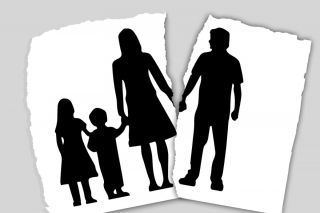Divorce
3 Problems With Staying Together for the Kids
3. The long-term cost of poor relationship modeling.
Updated April 25, 2024 Reviewed by Michelle Quirk
Key points
- Staying together "for the kids" can do more harm than good.
- Seeing parents in an unhappy marriage has negative consequences for children.
- The consequences of being raised by an unhappy couple have long-term impacts on a child's well-being.

As I wrote in a previous post, deciding to divorce is a difficult decision. Concluding whether to stay or go is often complicated by the presence of children, with folks often noting that “We’re staying together for the kids,” or “Once they go to college, we’ll separate.”
As a child of divorce, I know the decision to stay or leave is no easy task. Emotional considerations, financial concerns, and societal or cultural pressures make hitting the eject button on a marriage difficult. However, as a researcher, I know the detrimental consequences that staying in a conflicted or unhappy marriage can have on children.
When I first began my career as a professor, I vividly remember students coming back to campus after Labor Day weekend bereft because their parents told them that they were getting divorced now that they were "out of the house.” This wasn’t an every-student occurrence, obviously, but happened frequently enough that I began to study this phenomenon (i.e., late-life parental divorce) by interviewing adult children of divorce. Often, these adult children were angry at their parents for waiting so long to divorce. Some wondered if their entire childhoods had been a lie, while others reflected on how different their childhoods and lives could have been if their parents had divorced when they were younger.
Now, as an adult in middle age, I’ve entered the stage where divorces (or conversations about divorce) happen regularly. Although some couples make the decision to uncouple, I hear of countless others staying together with the best intentions, unaware of the damage they unwittingly do. Although this decision is often made with the children’s well-being in mind, staying in a conflictual or unhappy marriage rather than divorcing has long-term, and often negative, consequences that reverberate far beyond childhood.
3 Negative Consequences of Staying Together for the Kids
- Alliances. Parents often don’t do a great job of hiding their contempt for their spouse when they’re in an unhappy marriage. Moreover, they often look to their children as allies, roping them into conflict and creating an alliance with them, an “us against the other parent” dynamic. As a result, children feel "caught” between their two parents. This dysfunctional dynamic damages the parent-child relationship, including the relationship with the parent who draws them into the alliance, as their actions can be viewed as poisoning the child’s relationship with the other parent. When children feel caught in this way, they often withdraw from parents physically and communicatively and feel decreased satisfaction and closeness with them. Researchers found that children in intact, but high-conflict families/marriage often experience the greatest amount of feeling caught.
- Parentification. When stuck in an unhappy marriage, parents may unwittingly engage in parentification, expecting or requesting their child to take on an adult role. More specifically, emotional parentification is a destructive behavior that occurs when a parent relies on their child for emotional support. Perhaps they disclose inappropriate information to their child including fights they have with their spouse, their desire to divorce, or disdain for the partner/parent. They may also seek comfort and reassurance from their child about their decision to stay in the relationship, forcing the child to forgo their own caretaking needs to meet the parent’s needs and act as a pseudo-spouse or friend. Unsurprisingly, emotional parentification has long-lasting, negative effects on children including a lack of emotional regulation, disrupted peer relationships, dissociation, and depression.
- Poor modeling of healthy relationships. When parents stay in an unhappy marriage “for the children,” they inadvertently create poor working models of what relationships, or marriages, should be like, setting up their children for failure, including staying in unhappy relationships because “that’s just how it goes.” Additionally, children witnessing frequent or high conflict in marriage may also fail to learn appropriate conflict management skills and rely on destructive habits such as withdrawal, avoidance, or, in some cases, even violent or impulsive behaviors. These working models of conflict resolution and poor communication can have long-lasting impacts and influence children’s ability to develop and, importantly, maintain healthy and satisfying relationships with romantic partners and friends.
Glennon Doyle, author of Untamed and Love Warrior, wrote in one of her books that when she realized she wouldn’t want her own marriage for her children, she realized she had to leave. Think for yourself: Is this the marriage you would want for your child? Is this how you want your child to think marriage or committed partnerships work? Do you want to burden your child with your emotional needs?
Although many parents have wonderful intentions when deciding to stick it out in an unhappy marriage, this plan, ultimately, backfires. So when you’re on the cusp or see-sawing about your decision to end your marriage, think about your children and specifically the positive outcomes that might be associated with a brave decision to move on.
For more, follow me on Instagram @dr.sylviamikuckienyart
Facebook image: fizkes/Shutterstock


